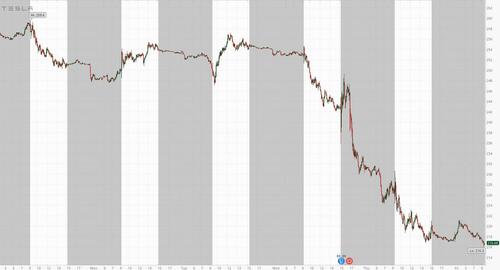
In a clear retaliation at the west for ratcheting sanctions on chip exports, China, the world’s largest producer and supplier of graphite, said it will require export permits for some graphite products as of December 1 as it seeks to protect its national security, the Chinese Commerce Ministry said on Friday.
Graphite and graphite products are critical for the manufacturing of any electric vehicle battery, and China is the dominant player in the market. Shares of Tesla, Rivian, Nikola, VinFast and Fisker are lower in premarket trading
As of December 1, exporters of high-purity, high-hardness, and high-intensity synthetic graphite material, as well as exporters of natural flake graphite and its products, will have to apply for permits to ship those products out of China.
As Oilprice notes, the move to require permits from exporters to export two types of graphite is seen as China looking to respond to the recent restrictions and investigations by Western governments of Chinese products and manufacturing practices, even though the country’s commerce ministry said it was not targeting any particular country with the move.
The restriction on exports of graphite products is the latest Chinese attempt to exert its market influence to control the supply of critical minerals.
The requirement for graphite export permits is “conducive to ensuring the security and stability of the global supply chain and industrial chain, and conducive to better safeguarding national security and interests,” the Chinese ministry said, as quoted by Reuters.
Earlier this year, China sent shockwaves through the supply chain and chip markets after announcing export controls on two rare earth metals, gallium and germanium.
The technology and critical metals trade war has escalated since the summer.
Earlier this month, the European Commission launched an anti-subsidy investigation into the imports of EVs from China, to determine whether BEV value chains in China benefit from illegal subsidies and whether this subsidization causes or threatens to cause economic injury to EU producers.
And this week, the U.S. said it would ban the sale of more advanced AI chips to China.
Limited diversification of supply could present a challenge to the global critical minerals industry, the International Energy Agency (IEA) warned in a report earlier this year. China, the Democratic Republic of Congo, and Indonesia continue to dominate a large part of the critical raw material supply, while China is a dominant player in refining operations, the IEA noted.
In a clear retaliation at the west for ratcheting sanctions on chip exports, China, the world’s largest producer and supplier of graphite, said it will require export permits for some graphite products as of December 1 as it seeks to protect its national security, the Chinese Commerce Ministry said on Friday.
Graphite and graphite products are critical for the manufacturing of any electric vehicle battery, and China is the dominant player in the market. Shares of Tesla, Rivian, Nikola, VinFast and Fisker are lower in premarket trading
As of December 1, exporters of high-purity, high-hardness, and high-intensity synthetic graphite material, as well as exporters of natural flake graphite and its products, will have to apply for permits to ship those products out of China.
As Oilprice notes, the move to require permits from exporters to export two types of graphite is seen as China looking to respond to the recent restrictions and investigations by Western governments of Chinese products and manufacturing practices, even though the country’s commerce ministry said it was not targeting any particular country with the move.
The restriction on exports of graphite products is the latest Chinese attempt to exert its market influence to control the supply of critical minerals.
The requirement for graphite export permits is “conducive to ensuring the security and stability of the global supply chain and industrial chain, and conducive to better safeguarding national security and interests,” the Chinese ministry said, as quoted by Reuters.
Earlier this year, China sent shockwaves through the supply chain and chip markets after announcing export controls on two rare earth metals, gallium and germanium.
The technology and critical metals trade war has escalated since the summer.
Earlier this month, the European Commission launched an anti-subsidy investigation into the imports of EVs from China, to determine whether BEV value chains in China benefit from illegal subsidies and whether this subsidization causes or threatens to cause economic injury to EU producers.
And this week, the U.S. said it would ban the sale of more advanced AI chips to China.
Limited diversification of supply could present a challenge to the global critical minerals industry, the International Energy Agency (IEA) warned in a report earlier this year. China, the Democratic Republic of Congo, and Indonesia continue to dominate a large part of the critical raw material supply, while China is a dominant player in refining operations, the IEA noted.
Loading…






